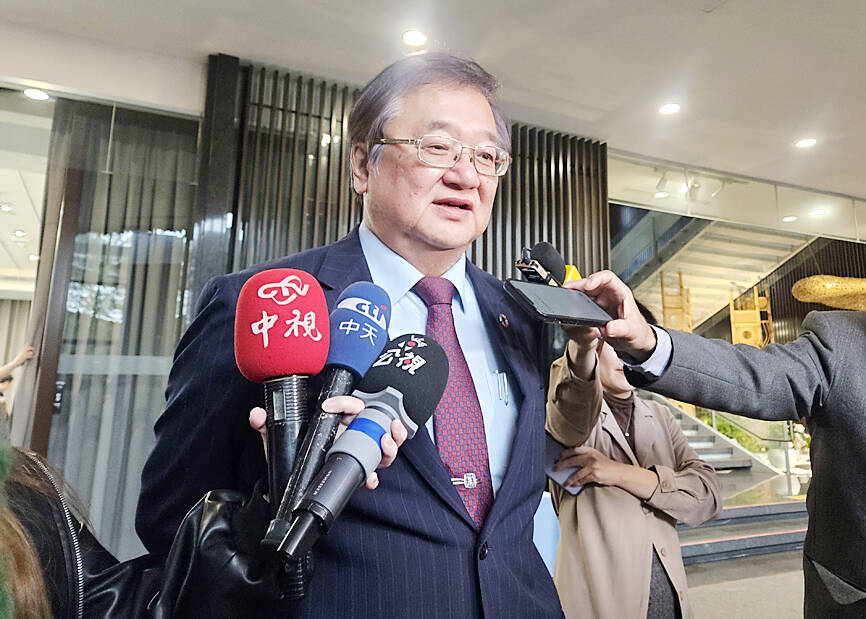Projects and services benefiting the public are to be severely affected if an amendment to fiscal planning law passed on Friday last week is officially promulgated, government agencies said yesterday.
Executive Yuan spokeswoman Michelle Lee (李慧芝) on Monday said that the amendments to the Act Governing the Allocation of Government Revenues and Expenditures (財政收支劃分法) would take effect three days after it is promulgated by President William Lai (賴清德).
Next year’s overall government budget would be seriously affected by the amendments and might need to be reallocated, she added.

Photo: CNA
Under the changes, the central government needs to allocate NT$375.3 billion (US$11.49 billion) to local governments, the Directorate-General of Budget, Accounting and Statistics said.
As a result, funding for the Ministry of Health and Welfare and Ministry of National Defense would be reduced by 28 percent, it said.
Speaking to reporters yesterday prior to a news conference, Minister of Health and Welfare Chiu Tai-yuan (邱泰源) said that the amendments would cause public health and social welfare funds to shrink, including childcare subsidies.
It would also affect the health ministry’s efforts to strengthen cancer prevention and expand free cancer screenings, as well as funding for cancer treatments, research and drugs, Chiu said.
Efforts aimed at countering the declining birthrate, including childcare subsidies for children aged 2 and younger, various childcare services and subsidies for assisted reproduction treatments would also be impacted, he said.
Health and welfare policies have nationwide significance and cannot be determined solely based on local preferences, he added.
“We place great emphasis on overall inclusiveness, ensuring that all citizens have equal access to healthcare regardless of which county or city they live in,” Chiu said.
That requires the central government to have sufficient resources to improve healthcare, social welfare and medical services, and create better working conditions for medical and healthcare professionals, he said.
Meanwhile, Minister of Environment Peng Chi-ming (彭啟明) said that the amendments would mean a significant budget reduction for his ministry and affect inter-regional initiatives such as waste management and the net zero carbon goals.
The environment ministry faces budget cuts of up to NT$2 billion due to the amendments, Peng told reporters.
The central government would have less capacity to contribute to net zero carbon initiatives, which means net zero carbon targets might need to be adjusted, he said.
Subsidies for electric buses, which improve air quality and often support disadvantaged regions, could also be impacted, he added.
The environment ministry currently handles construction and waste management projects by coordinating with local governments, but if funding is shifted to local governments, local authorities would need to shoulder more responsibility and differing priorities between regions could lead to certain issues being overlooked, Peng said.

Trips for more than 100,000 international and domestic air travelers could be disrupted as China launches a military exercise around Taiwan today, Taiwan’s Civil Aviation Administration (CAA) said yesterday. The exercise could affect nearly 900 flights scheduled to enter the Taipei Flight Information Region (FIR) during the exercise window, it added. A notice issued by the Chinese Civil Aviation Administration showed there would be seven temporary zones around the Taiwan Strait which would be used for live-fire exercises, lasting from 8am to 6pm today. All aircraft are prohibited from entering during exercise, it says. Taipei FIR has 14 international air routes and

The Ministry of National Defense (MND) today released images of the military tracking China’s People's Liberation Army (PLA) movements during the latest round of Chinese drills around Taiwan. The PLA began "Justice Mission 2025" drills today, carrying out live-fire drills, simulated strikes on land and maritime targets, and exercises to blockade the nation's main ports. The exercises are to continue tomorrow, with the PLA announcing sea and air space restrictions for five zones around Taiwan for 10 hours starting from 8:30am. The ministry today released images showing a Chinese J-16 fighter jet tracked by a F-16V Block 20 jet and the

City buses in Taipei and New Taipei City, as well as the Taipei MRT, would on Saturday begin accepting QR code payments from five electronic payment providers, the Taipei Department of Transportation said yesterday. The new option would allow passengers to use the “transportation QR code” feature from EasyWallet, iPass Money, iCash Pay, Jkopay or PXPay Plus. Passengers should open their preferred electronic payment app, select the “transportation code” — not the regular payment code — unlock it, and scan the code at ticket readers or gates, General Planning Division Director-General Liu Kuo-chu (劉國著) said. People should move through the

Snow fell on Yushan (Jade Mountain, 玉山) yesterday morning as a continental cold air mass sent temperatures below freezing on Taiwan’s tallest peak, the Central Weather Administration (CWA) said. Snowflakes were seen on Yushan’s north peak from 6:28am to 6:38am, but they did not fully cover the ground and no accumulation was recorded, the CWA said. As of 7:42am, the lowest temperature recorded across Taiwan was minus-5.5°C at Yushan’s Fengkou observatory and minus-4.7°C at the Yushan observatory, CWA data showed. On Hehuanshan (合歡山) in Nantou County, a low of 1.3°C was recorded at 6:39pm, when ice pellets fell at Songsyue Lodge (松雪樓), a